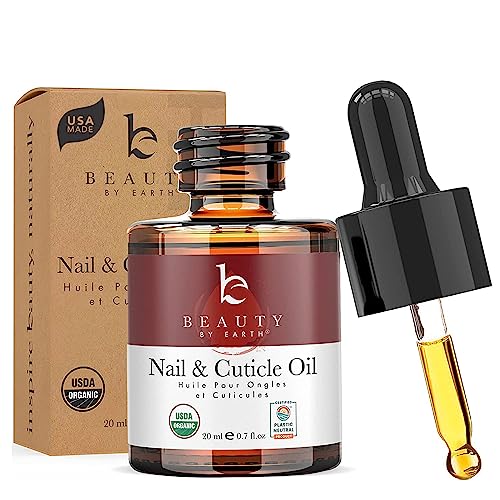
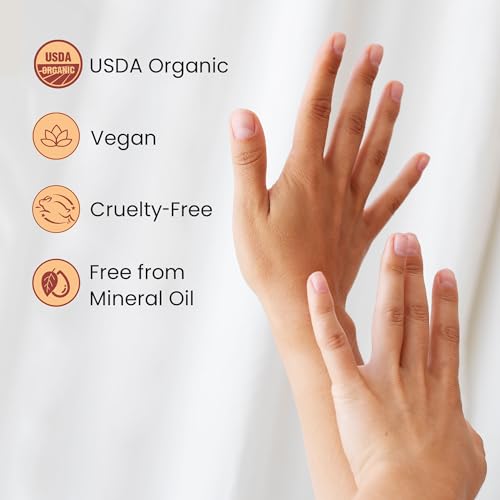
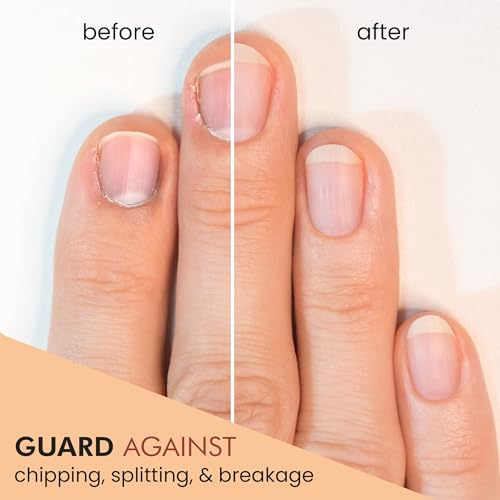
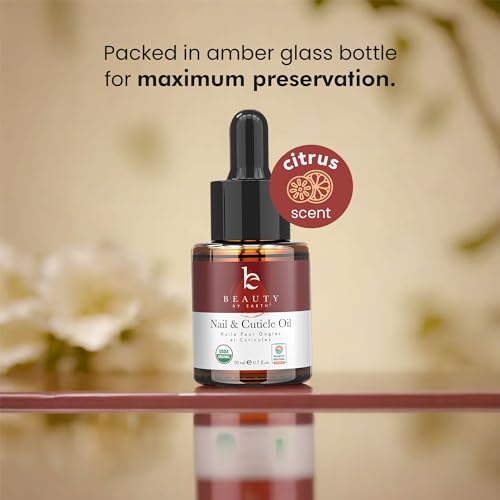
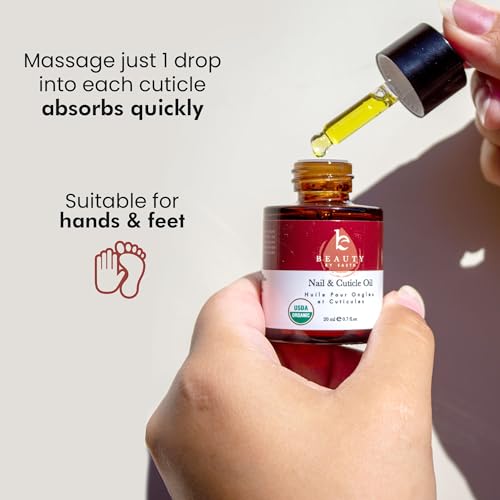
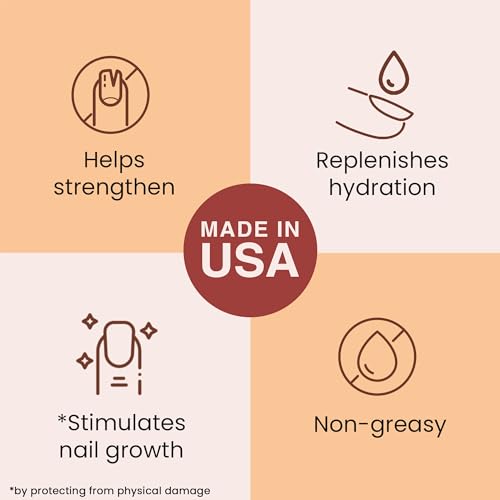
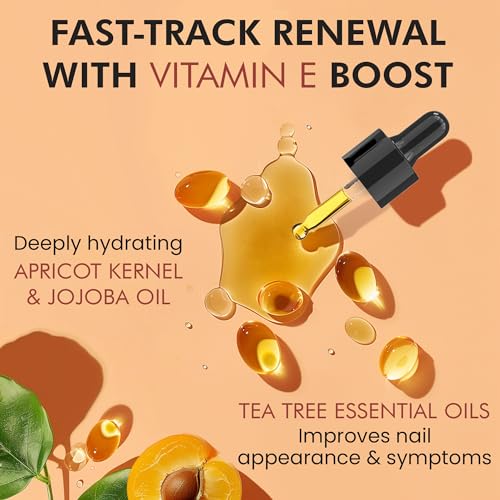
Organic Nail & Cuticle Oil - Nourishes & Strengthens, Jojoba & Vitamin E - 0.5oz USA Made


Algae/Seaweed/Kelp Extract (Species Unspecified)
Medium RiskAlgae extract is an unspecified botanical extract derived from various algae species, commonly used in cosmetic and personal care products for its potential hydrating and nutrient-rich properties. It is valued for its ability to contribute to product formulation by offering texture enhancement and moisture retention.
Sustai Insights
Algae extract offers functional benefits such as hydration and nutrient delivery, which can enhance skin health. Its sustainability credentials may include being biodegradable and derived from renewable sources. However, potential health risks are low, with minimal concerns regarding carcinogenicity, allergens, or reproductive toxicity. Environmental risks primarily involve contamination, while regulatory warnings indicate that it should be sourced responsibly. Overall, the risk level is assessed as medium, suggesting careful usage and consideration of sourcing practices, with alternatives like plant-based extracts available.
Citrus Limon (Lemon) Peel Oil
Medium RiskCitrus limon (lemon) peel oil is an essential oil derived from the peel of lemons, commonly used for its aromatic properties and as a natural flavoring agent. It is often included in personal care products for its fragrance and potential antimicrobial properties.
Sustai Insights
Citrus limon (lemon) peel oil offers functional benefits as a natural fragrance and may possess antimicrobial properties, contributing to product stability. However, it is associated with a high allergenic potential, moderate use restrictions, and has been noted for its persistence in the environment. Regulatory warnings indicate restrictions on verified products due to potential irritation and sensitization. The overall risk level is medium, and safe usage practices should be observed to mitigate exposure risks. Alternatives include safer fragrance options or essential oils with lower allergenic profiles.
Ricinus Communis (Castor) Seed Oil
Medium RiskCastor oil is extracted from the seeds of Ricinus communis and is commonly used in cosmetic and personal care products for its moisturizing and emollient properties. It is known for its ability to enhance skin absorption and provide a protective barrier.
Sustai Insights
Castor oil offers functional benefits as a moisturizer and emollient, enhancing skin absorption and providing a barrier against moisture loss. It is sustainably sourced and biodegradable. However, potential health risks include low levels of irritation and moderate concerns regarding developmental and reproductive toxicity. Environmental risks are low, with no significant pollutant or bioaccumulation concerns reported. Regulatory status shows no current restrictions. Overall, the risk level is assessed as medium, with recommendations for safe usage practices, and potential alternatives include other plant-based oils.
Citrus Aurantium Dulcis (Orange) Peel Oil
Medium RiskCitrus aurantium dulcis (orange) peel oil is derived from the peel of oranges and is commonly used in cosmetic and personal care products for its fragrance and potential skin benefits. It is known for its aromatic properties and is often included in formulations aimed at enhancing scent profiles.
Sustai Insights
Citrus aurantium dulcis (orange) peel oil offers functional benefits such as providing a pleasant scent and potential antimicrobial properties. However, it poses a high allergy risk and may cause skin irritation in sensitive individuals. Environmental concerns include moderate persistence and potential to contribute to pollution. Regulatory warnings indicate restrictions on use in certain products. Overall, the risk level is assessed as medium, and users are advised to practice caution, particularly those with known allergies. Alternatives like sweet orange essential oil may provide similar benefits with potentially lower risks.
Melaleuca Alternifolia (Tea Tree) Leaf Oil
Medium RiskMelaleuca alternifolia (tea tree) leaf oil is derived from the leaves of the Melaleuca alternifolia tree. It is commonly used in personal care products for its antiseptic and antimicrobial properties, making it a popular ingredient for skincare formulations.
Sustai Insights
Tea tree leaf oil offers functional benefits, including antimicrobial properties that can help with skin conditions. However, it has a high allergenic potential and may cause skin irritation or allergic reactions in sensitive individuals. Additionally, while it poses low to moderate risks concerning endocrine disruption and reproductive toxicity, it is restricted in certain formulations. Overall, the ingredient is assessed as medium risk, necessitating careful usage and consideration of alternatives for sensitive populations.
Vitis Vinifera (Grape) Seed Oil
Low RiskVitis vinifera (grape) seed oil is derived from the seeds of grapes, primarily used in cosmetics for its emollient properties. It acts as a moisturizer and is often included in formulations for skin care products due to its fatty acid composition and antioxidant potential.
Sustai Insights
Grape seed oil provides functional benefits as an effective moisturizer and antioxidant, contributing to skin hydration and protection. It is sustainably sourced and biodegradable. Health risks are low, with minimal concerns regarding carcinogenicity, allergies, or reproductive toxicity. Environmental impact is also low, with no significant pollutant potential. Regulatory bodies do not impose restrictions on its use. Overall, the ingredient poses a low risk, making it a safe choice in cosmetic formulations.
Prunus Armeniaca (Apricot) Oil
Low RiskPrunus armeniaca (apricot) oil is a cosmetic ingredient derived from the seeds of the apricot fruit. It functions primarily as a moisturizer and emollient in cosmetic formulations, providing hydration to the skin while enhancing the texture and feel of products.
Sustai Insights
Prunus armeniaca oil offers functional benefits as a moisturizer and emollient, supporting skin hydration and texture. It is sustainably sourced with low environmental impact. Health risks are minimal, as it has low concerns for carcinogenicity, allergies, and reproductive toxicity. Regulatory bodies do not impose restrictions on its use. Overall, the ingredient is assessed to have low risk, making it a safe choice in cosmetic formulations. Alternatives include other plant oils that offer similar moisturizing properties.
Olea Europaea (Olive) Oil
Low RiskOlea europaea (olive) oil is derived from the ripe fruit of the olive tree. It is commonly used in cosmetic formulations primarily as a moisturizer and emollient due to its nourishing properties for the skin. It also serves as a carrier oil for other ingredients in formulations.
Sustai Insights
Olea europaea (olive) oil offers numerous functional benefits, including effective moisturization and enhanced skin absorption properties, making it suitable for various cosmetic applications. It is a biodegradable ingredient, contributing to sustainability when sourced responsibly. Health risks are low, with minimal concerns regarding carcinogenicity, allergenic potential, and developmental toxicity. Environmental risks are also low, with no significant bioaccumulation or pollution potential noted. Regulatory bodies do not impose restrictions on its use. Overall, olive oil presents a low risk profile, making it a favorable choice in cosmetic products.
Horsetail (Equisetum Arvense)
Low RiskHorsetail (Equisetum arvense) is a perennial plant known for its high silica content, commonly used in cosmetics and herbal remedies. It functions primarily as a skin conditioning agent, promoting skin health and providing potential benefits for hair and nails.
Sustai Insights
Horsetail offers functional benefits such as promoting skin and hair health due to its silica content, which may strengthen connective tissues. It is generally regarded as low risk regarding health concerns, with minimal known adverse effects or regulatory restrictions. Environmental risks are also low. Safe usage practices should be followed, with no significant alternatives noted. Overall, horsetail is assessed as low risk.
Tocopherol
Low RiskTocopherols are a class of naturally occurring compounds, primarily known for their role as antioxidants. They are commonly used in cosmetic and skincare products to help stabilize formulations and protect ingredients from oxidative damage.
Sustai Insights
Tocopherols provide functional benefits such as antioxidant protection and skin conditioning. They are generally recognized as safe, with low concerns regarding carcinogenicity, allergies, and reproductive toxicity. However, enhanced skin absorption and potential endocrine disruption are noted. Regulatory bodies have not imposed significant restrictions on tocopherols, categorizing the overall risk as low. Safe usage practices should be observed, and while alternatives exist, tocopherols remain a viable option in formulations.
Helianthus Annuus (Sunflower) Seed Oil
Low RiskHelianthus annuus (sunflower) seed oil is derived from the seeds of the sunflower plant. It serves primarily as an emollient and moisturizer in cosmetic formulations, helping to maintain skin hydration and improve texture.
Sustai Insights
Sunflower seed oil is effective as an emollient, providing moisture and improving skin texture while being biodegradable and sustainably sourced. It poses low health risks, including negligible concerns for carcinogenicity, allergies, or reproductive toxicity. Environmentally, it does not significantly contribute to pollution or bioaccumulation. Regulatory bodies currently do not list any advisories for this ingredient. Overall, it is assessed as low risk, with safe usage practices recommended. Alternatives include oils like jojoba or almond oil for those seeking different properties.
Simmondsia Chinensis (Jojoba) Seed Oil
Low RiskSimmondsia chinensis (jojoba) seed oil is extracted from the seeds of the jojoba plant. It is commonly used in cosmetics for its moisturizing properties and ability to mimic human sebum, making it beneficial for skin and hair care formulations.
Sustai Insights
Jojoba seed oil offers functional benefits such as effective moisturization and emollience, contributing to skin hydration and smoothness. It is sustainably sourced and biodegradable. Health risks are low, with minimal concerns regarding carcinogenicity, allergies, and reproductive toxicity. Environmental risks are also low, as it does not significantly contribute to pollution or bioaccumulation. Currently, there are no regulatory restrictions on its use. Overall, the risk level is low, and it is considered a safe ingredient with no significant adverse effects.
Vitis Vinifera (Grape) Seed Oil
Low RiskVitis vinifera (grape) seed oil is derived from the seeds of grapes, primarily used in cosmetics for its emollient properties. It acts as a moisturizer and is often included in formulations for skin care products due to its fatty acid composition and antioxidant potential.
Sustai Insights
Grape seed oil provides functional benefits as an effective moisturizer and antioxidant, contributing to skin hydration and protection. It is sustainably sourced and biodegradable. Health risks are low, with minimal concerns regarding carcinogenicity, allergies, or reproductive toxicity. Environmental impact is also low, with no significant pollutant potential. Regulatory bodies do not impose restrictions on its use. Overall, the ingredient poses a low risk, making it a safe choice in cosmetic formulations.
Prunus Armeniaca (Apricot) Oil
Low RiskPrunus armeniaca (apricot) oil is a cosmetic ingredient derived from the seeds of the apricot fruit. It functions primarily as a moisturizer and emollient in cosmetic formulations, providing hydration to the skin while enhancing the texture and feel of products.
Sustai Insights
Prunus armeniaca oil offers functional benefits as a moisturizer and emollient, supporting skin hydration and texture. It is sustainably sourced with low environmental impact. Health risks are minimal, as it has low concerns for carcinogenicity, allergies, and reproductive toxicity. Regulatory bodies do not impose restrictions on its use. Overall, the ingredient is assessed to have low risk, making it a safe choice in cosmetic formulations. Alternatives include other plant oils that offer similar moisturizing properties.
Algae/Seaweed/Kelp Extract (Species Unspecified)
Medium RiskAlgae extract is an unspecified botanical extract derived from various algae species, commonly used in cosmetic and personal care products for its potential hydrating and nutrient-rich properties. It is valued for its ability to contribute to product formulation by offering texture enhancement and moisture retention.
Sustai Insights
Algae extract offers functional benefits such as hydration and nutrient delivery, which can enhance skin health. Its sustainability credentials may include being biodegradable and derived from renewable sources. However, potential health risks are low, with minimal concerns regarding carcinogenicity, allergens, or reproductive toxicity. Environmental risks primarily involve contamination, while regulatory warnings indicate that it should be sourced responsibly. Overall, the risk level is assessed as medium, suggesting careful usage and consideration of sourcing practices, with alternatives like plant-based extracts available.
Olea Europaea (Olive) Oil
Low RiskOlea europaea (olive) oil is derived from the ripe fruit of the olive tree. It is commonly used in cosmetic formulations primarily as a moisturizer and emollient due to its nourishing properties for the skin. It also serves as a carrier oil for other ingredients in formulations.
Sustai Insights
Olea europaea (olive) oil offers numerous functional benefits, including effective moisturization and enhanced skin absorption properties, making it suitable for various cosmetic applications. It is a biodegradable ingredient, contributing to sustainability when sourced responsibly. Health risks are low, with minimal concerns regarding carcinogenicity, allergenic potential, and developmental toxicity. Environmental risks are also low, with no significant bioaccumulation or pollution potential noted. Regulatory bodies do not impose restrictions on its use. Overall, olive oil presents a low risk profile, making it a favorable choice in cosmetic products.
Citrus Limon (Lemon) Peel Oil
Medium RiskCitrus limon (lemon) peel oil is an essential oil derived from the peel of lemons, commonly used for its aromatic properties and as a natural flavoring agent. It is often included in personal care products for its fragrance and potential antimicrobial properties.
Sustai Insights
Citrus limon (lemon) peel oil offers functional benefits as a natural fragrance and may possess antimicrobial properties, contributing to product stability. However, it is associated with a high allergenic potential, moderate use restrictions, and has been noted for its persistence in the environment. Regulatory warnings indicate restrictions on verified products due to potential irritation and sensitization. The overall risk level is medium, and safe usage practices should be observed to mitigate exposure risks. Alternatives include safer fragrance options or essential oils with lower allergenic profiles.
Horsetail (Equisetum Arvense)
Low RiskHorsetail (Equisetum arvense) is a perennial plant known for its high silica content, commonly used in cosmetics and herbal remedies. It functions primarily as a skin conditioning agent, promoting skin health and providing potential benefits for hair and nails.
Sustai Insights
Horsetail offers functional benefits such as promoting skin and hair health due to its silica content, which may strengthen connective tissues. It is generally regarded as low risk regarding health concerns, with minimal known adverse effects or regulatory restrictions. Environmental risks are also low. Safe usage practices should be followed, with no significant alternatives noted. Overall, horsetail is assessed as low risk.
Ricinus Communis (Castor) Seed Oil
Medium RiskCastor oil is extracted from the seeds of Ricinus communis and is commonly used in cosmetic and personal care products for its moisturizing and emollient properties. It is known for its ability to enhance skin absorption and provide a protective barrier.
Sustai Insights
Castor oil offers functional benefits as a moisturizer and emollient, enhancing skin absorption and providing a barrier against moisture loss. It is sustainably sourced and biodegradable. However, potential health risks include low levels of irritation and moderate concerns regarding developmental and reproductive toxicity. Environmental risks are low, with no significant pollutant or bioaccumulation concerns reported. Regulatory status shows no current restrictions. Overall, the risk level is assessed as medium, with recommendations for safe usage practices, and potential alternatives include other plant-based oils.
Citrus Aurantium Dulcis (Orange) Peel Oil
Medium RiskCitrus aurantium dulcis (orange) peel oil is derived from the peel of oranges and is commonly used in cosmetic and personal care products for its fragrance and potential skin benefits. It is known for its aromatic properties and is often included in formulations aimed at enhancing scent profiles.
Sustai Insights
Citrus aurantium dulcis (orange) peel oil offers functional benefits such as providing a pleasant scent and potential antimicrobial properties. However, it poses a high allergy risk and may cause skin irritation in sensitive individuals. Environmental concerns include moderate persistence and potential to contribute to pollution. Regulatory warnings indicate restrictions on use in certain products. Overall, the risk level is assessed as medium, and users are advised to practice caution, particularly those with known allergies. Alternatives like sweet orange essential oil may provide similar benefits with potentially lower risks.
Melaleuca Alternifolia (Tea Tree) Leaf Oil
Medium RiskMelaleuca alternifolia (tea tree) leaf oil is derived from the leaves of the Melaleuca alternifolia tree. It is commonly used in personal care products for its antiseptic and antimicrobial properties, making it a popular ingredient for skincare formulations.
Sustai Insights
Tea tree leaf oil offers functional benefits, including antimicrobial properties that can help with skin conditions. However, it has a high allergenic potential and may cause skin irritation or allergic reactions in sensitive individuals. Additionally, while it poses low to moderate risks concerning endocrine disruption and reproductive toxicity, it is restricted in certain formulations. Overall, the ingredient is assessed as medium risk, necessitating careful usage and consideration of alternatives for sensitive populations.
Tocopherol
Low RiskTocopherols are a class of naturally occurring compounds, primarily known for their role as antioxidants. They are commonly used in cosmetic and skincare products to help stabilize formulations and protect ingredients from oxidative damage.
Sustai Insights
Tocopherols provide functional benefits such as antioxidant protection and skin conditioning. They are generally recognized as safe, with low concerns regarding carcinogenicity, allergies, and reproductive toxicity. However, enhanced skin absorption and potential endocrine disruption are noted. Regulatory bodies have not imposed significant restrictions on tocopherols, categorizing the overall risk as low. Safe usage practices should be observed, and while alternatives exist, tocopherols remain a viable option in formulations.
Helianthus Annuus (Sunflower) Seed Oil
Low RiskHelianthus annuus (sunflower) seed oil is derived from the seeds of the sunflower plant. It serves primarily as an emollient and moisturizer in cosmetic formulations, helping to maintain skin hydration and improve texture.
Sustai Insights
Sunflower seed oil is effective as an emollient, providing moisture and improving skin texture while being biodegradable and sustainably sourced. It poses low health risks, including negligible concerns for carcinogenicity, allergies, or reproductive toxicity. Environmentally, it does not significantly contribute to pollution or bioaccumulation. Regulatory bodies currently do not list any advisories for this ingredient. Overall, it is assessed as low risk, with safe usage practices recommended. Alternatives include oils like jojoba or almond oil for those seeking different properties.
Simmondsia Chinensis (Jojoba) Seed Oil
Low RiskSimmondsia chinensis (jojoba) seed oil is extracted from the seeds of the jojoba plant. It is commonly used in cosmetics for its moisturizing properties and ability to mimic human sebum, making it beneficial for skin and hair care formulations.
Sustai Insights
Jojoba seed oil offers functional benefits such as effective moisturization and emollience, contributing to skin hydration and smoothness. It is sustainably sourced and biodegradable. Health risks are low, with minimal concerns regarding carcinogenicity, allergies, and reproductive toxicity. Environmental risks are also low, as it does not significantly contribute to pollution or bioaccumulation. Currently, there are no regulatory restrictions on its use. Overall, the risk level is low, and it is considered a safe ingredient with no significant adverse effects.
Discover the power of healthy nails with our Organic Nail and Cuticle Oil, expertly crafted in the USA. This nourishing blend of Jojoba Oil and Vitamin E hydrates and revitalizes, promoting growth and strength while protecting against damage.
- Nourish and Hydrate: This unique formula deeply moisturizes nails and cuticles, preventing hangnails and promoting overall nail health.
- Deep Conditioning: Designed to penetrate deeply, it conditions and strengthens nails, making them less prone to breaking.
- Transformative Benefits: Ideal for damaged nails, this oil strengthens and hardens, ensuring a beautiful finish.
- Cuticle Repair Solution: Functions as a multi-purpose treatment, enhancing the vitality of both nails and cuticles.
- Made in the USA: Trust in a product from a female-founded, Texas-based company that prioritizes quality and customer satisfaction.
Subscribe & Save with Sustai
- Best Price Guarantee: Always enjoy the lowest prices on sustainable home essentials.
- No Surprises: We’ll notify you before shipping. No hidden fees, ever.
- You’re in Charge: Change, pause, or cancel your subscription anytime with ease.
- Eco-Friendly Deliveries: Our grouped shipments mean less packaging and lower emissions.
Join us on a sustainable journey. Special offers for a limited time! Prices and promotions may change.
Recommended Products
Discover the power of healthy nails with our Organic Nail and Cuticle Oil, expertly crafted in the USA. This nourishing blend of Jojoba Oil and Vitamin E hydrates and revitalizes, promoting growth and strength while protecting against damage.
- Nourish and Hydrate: This unique formula deeply moisturizes nails and cuticles, preventing hangnails and promoting overall nail health.
- Deep Conditioning: Designed to penetrate deeply, it conditions and strengthens nails, making them less prone to breaking.
- Transformative Benefits: Ideal for damaged nails, this oil strengthens and hardens, ensuring a beautiful finish.
- Cuticle Repair Solution: Functions as a multi-purpose treatment, enhancing the vitality of both nails and cuticles.
- Made in the USA: Trust in a product from a female-founded, Texas-based company that prioritizes quality and customer satisfaction.

You can have at most 2 Sustainable Steals products in your cart
Customer Reviews
Customers’ View
Customers appreciate the nourishing and hydrating qualities of this cuticle oil, noting its effectiveness in strengthening nails and improving overall nail health. Many users highlighted the pleasant scent, describing it as a soft citrus that enhances the experience of application. The product is praised for its moisturizing properties, with numerous reviews mentioning how it transforms dry cuticles and promotes a healthy appearance. Additionally, customers value the use of organic ingredients, aligning with their preferences for eco-friendly and health-conscious options. Overall, customers find the cuticle oil to be a reliable solution for maintaining healthy nails and cuticles while enjoying its luxurious feel.
AI-generated from the text of customer reviewsThis product has no reviews yet.





